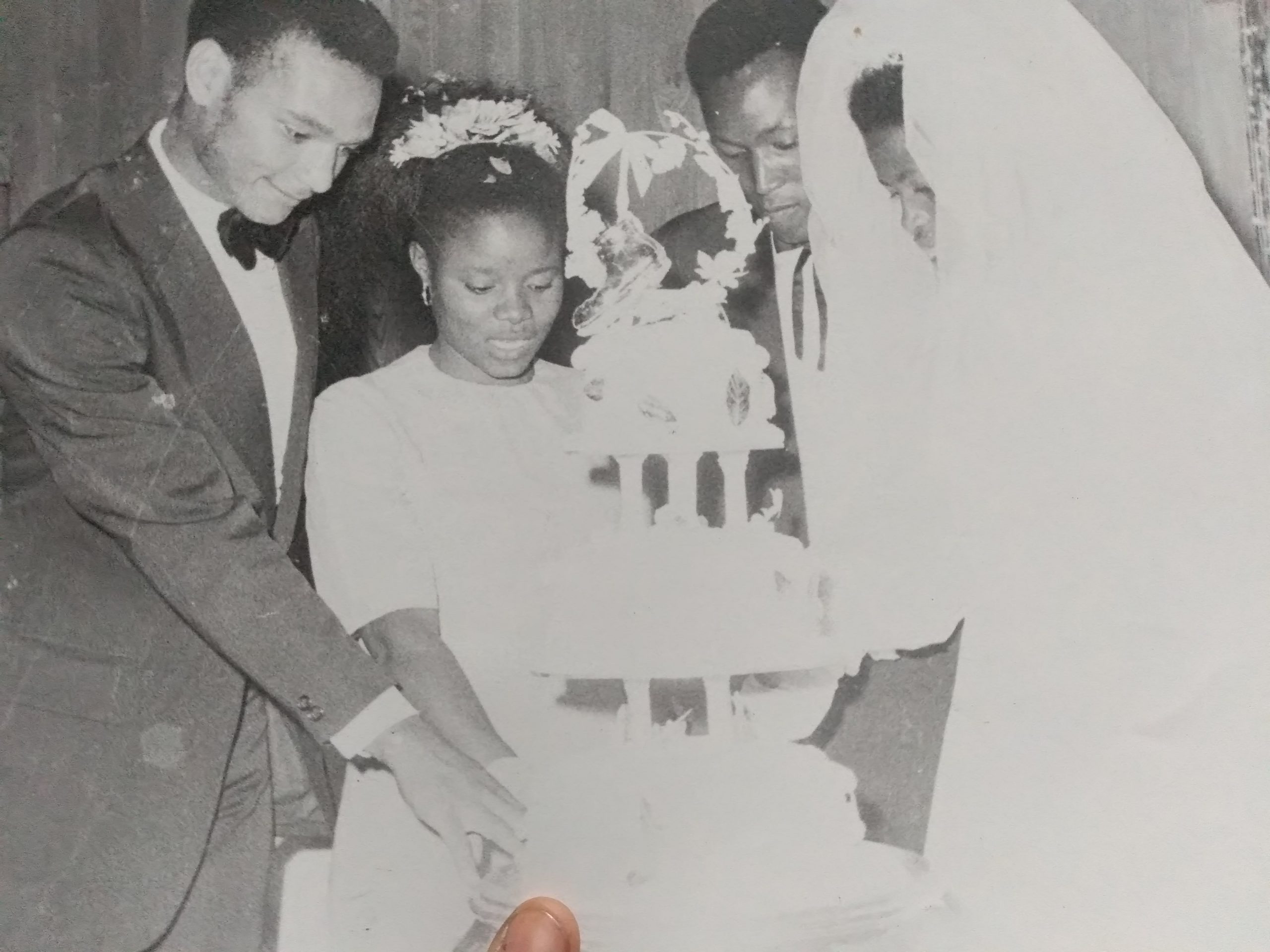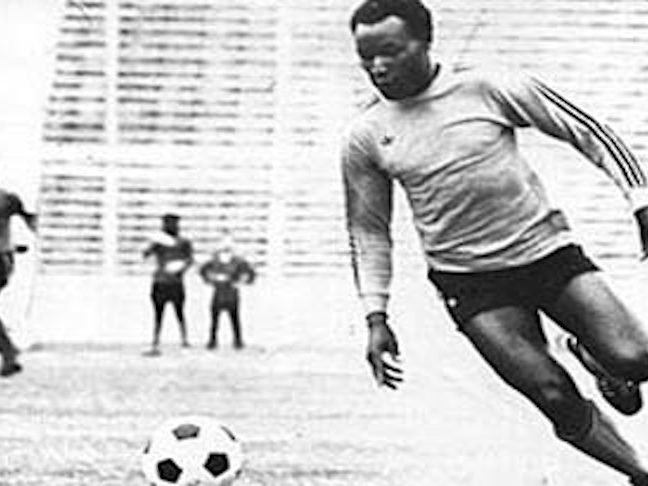
Africa’s Undisputed Goal King (Part Seven) – The Record Holder
June 14, 2020
Africa’s Undisputed Goal King (Part Nine) Different Strokes
June 17, 2020By Satish Sekar © Satish Sekar (May 5th 2020)
The Champion
Zambia’s Goal King, Godfrey Chitalu, had an exceptional year in 1972. He broke two of his own World Records, although neither were acknowledged until they had been broken.
In 1968 Chitalu broke Pelé’s decade-long records. The great Brasilian had capped of his first World-Cup winning year by setting the single-season and calendar-year goal-scoring record at 75.
Chitalu, then playing for Kitwe United, netted 81 goals in 1968. On his international debut against Uganda on June 29th 1968, aged 20, Chitalu failed to score in the 2-2 draw in Lusaka. He made up for the disappointment in his second match, scoring both of Zambia’s goals in another 2-2 draw against Uganda, but at the Scrivener Stadium in Kitwe.
In just six months, Chitalu had scored 12 times for Zambia. He had only played ten internationals.
These were the first of 79 goals that Chitalu would score for Zambia. That is an African record – one that places him in the top five scorers in international football.
Chitalu’s Assault on History
1968 was a memorable year for the man who would become Africa’s Goal King. 1972 would be even more memorable. He scored 107 goals in the Zambian season, a total that included two goals for Zambia. They came in the return leg of the World Cup qualifier against Lesotho in Ndola on June 4th 1972. Zambia won 6-1 on aggregate – the first leg had ended 0-0 in Maseru two months earlier. This was Lesotho’s debut in World Cup qualification.
Chitalu’s season tally of 107 is a World Record, but it doesn’t tell the whole story of Chitalu’s remarkable year. He began his assault on history by setting African Cup of Champions Clubs records for a match and for a tie at 7 and 9 respectively. Over 48 years later, Chitalu’s feat in champions’ competitions has not been acknowledged.
Chitalu set these records before the Zambian season began. That means that these goals – two African Cup of Champions Clubs records – have not been credited in the calendar year tally, meaning he set two World Records that year.
Godfrey Chitalu dominated Zambian sports awards. In 1972 he missed that edition of the African Cup of nations (AFCON). Zaire eliminated Zambia’s KK11. The Republic of Congo beat Mali 3-2 to claim their only title. Nevertheless, there’s no denying that the Zambian icon had had an absolutely phenomenal year – one that has never been equalled, let alone surpassed.
Detractors
Some claim that Chitalu never won an AFCON title, and never won the African Player of the Year Award. He only played in two AFCON Finals. The first in 1974 was Zambia’s debut at the event. Zambia returned to a hero’s welcome. They remain the only team to have lost the final on a replay.
Chitalu fell from favour with coach Ante Buselić during the competition. He scored his only AFCON goal against Egypt in the 1-3 loss to the hosts in the group stages. He did not play again in the tournament until the historic replay, where he replaced the suspended Simon Kaushi, but Zambia played and lost that match as a team.
The Footballing Great and Great Humanitarian
Zaire won their second AFCON trophy and went to the World Cup in 1974, the first Sub-Saharan team to do so. Unfortunately, greedy people destroyed their experience and those players were turned into pariahs, ironically by one of the most brutal kleptocratic dictators in African history, Joseph Mobutu.[1]
The legendary Pierre Ndaye Mulamba sadly suffered greatly after his football career drew to a close. Injustice plagued him. Even after he was honoured for his achievements in Egypt twenty years later, it somehow worked against him as thugs robbed him, killed his son and left him paralysed for the rest of his life.
Last year the Congolese great passed away – he was rightly honoured during the 2019 AFCON. Despite the horrors that he endured, Ndaye remained not only one of Africa’s greatest footballers, but a fantastic humanitarian too.
When asked which African player had impressed him the most, Ndaye replied as follows: “I’d say two: Godfrey Chitalu of Zambia, and Ghana’s Ibrahim Sunday. They were the greatest of their era. Chitalu perished in the Zambian air crash of April 1993 [he was then national team coach]. I hope the authorities are taking care of his family.”[2]
Kabwe’s Warrior
Buselić, a disciplinarian, decided that he could do without Chitalu throughout 1975. In his absence, Zambia failed to qualify for the 1976 AFCON. They also failed miserably in the 1975 CECAFA Cup. They were eliminated in the group stage without winning a single match, with a negative goal-difference and zero points. It was a disastrous campaign, made worse by the fact that Zambia was the host.
Chitalu made a brief return to the KK11 before being cast aside for another year. His next return to the national team left him determined to silence the detractors.
When he walked into the changing room for the half-time break in the 8-1 mauling of Malawi on March 26th 1977, Chitalu had no idea that the brace he scored in the first half closed the first half of his international career at a respectable 36.
He added a third in the second half. Three months later another brace took the AFCON qualifier against Algeria to penalties. Zambia won 6-5, meaning the KK11 would take part in the 1978 tournament in Ghana.
Battle of the Greats
It would boast three of the greatest players Africa ever produced – two on the path to greatness and the other approaching the dusk of a sensational career, or so it would have been for most players.
But Chitalu was no ordinary player – he was a rare and special talent who would defy the odds and even the laws of ageing that govern most footballers. The second half of his international career proved more prolific than the first and was achieved in less than half the time – an incredible return, especially for a player written off when supposedly at his prime.
All three were in the same group, so one at least was going no further.
Having done so much to earn a second bite at AFCON, fate conspired against him almost immediately. Obby Kapita gave Zambia a shock lead against the hosts after 8 minutes. The late great Opoku Afriye – Uganda’s Phillip Omondi and Nigeria’s Segun Odegbami tied Afriye for top-scorer in the competition – equalised, and Player of the Tournament Abdul Razak Karim got the winner.
But Zambia had suffered a bigger loss than two points – Chitalu went off nursing a bad injury. He was forced off the pitch with a hamstring injury on March 5th.
He missed the second match against Upper Volta – by far the most fortunate qualifier – as both Ivory Coast and Mali were disqualified.[3] Bizwell Phiri and Patrick Phiri kept Zambia in the hunt.
The Kabwe Warriors striker was determined to make an impact. Just five days after the hamstring injury forced him off the pitch, Chitalu played against Nigeria at the Accra Sports Stadium. Trying to play through the pain, he was forced off again by the injury.
Chitalu’s last bite at the Africa Cup of Nations had shown his character but ended in failure. He would, however, bounce back with a vengeance in another international tournament later that year. In fact, he would rewrite its records.
[1] Joseph Désiré Mobutu played a crucial part in the seizure and murder of Congolese independence icon Patrice Lumumba. He later seized power in a military coup, brutally murdered opponents or had them murdered, used and abused sport to bolster his rule, and looted Zaire’s economy. He was overthrown in 1997 and died in exile three months after he was overthrown by Laurent Kabila.
[2] See https://web.archive.org/web/20090907231719/http://simbasports.iquebec.com/interviewndaye.htm
[3] Ivory Coast had fielded an ineligible player in the second leg and Malian security had been unruly in the first leg.


